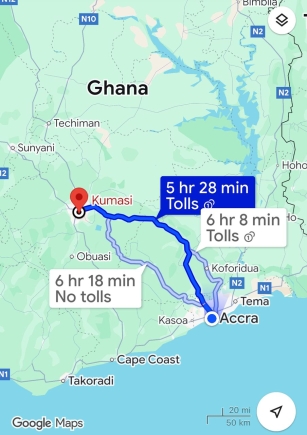
New Accra–Kumasi expressway will be a completely new road not mere upgrade of existing N6 route — Agbodza
The Minister of Roads and Highways, Governs Kwame Agbodza, has clarified that the planned Accra–Kumasi Expressway will be a completely new road built to expressway standards, and not a mere upgrade of the existing N6 route.
The Minister said this in Accra on Wednesday [July 30, 2025] at the government's weekly press briefings dubbed "Government Accountability Series.
Mr Agbodza explained that the project would be Ghana’s first purpose-built expressway, featuring limited access points, higher speed limits, and safety infrastructure designed to reduce travel time and prevent accidents.
“This is not just a dualisation of the old road. It’s an entirely new expressway, and we are currently procuring consultants to undertake detailed studies, designs, and costings,” he said in response to questions about whether the Ofankor–Kumasi stretch would have two or three lanes in each direction.
Mr Agbodza said that work on the Ofankor section of the N6 highway has resumed following recent payments to the contractor.
He noted that the broader expressway project would be delivered in phases, in line with President John Mahama’s infrastructure plans.
According to the Minister, part of the funding will come from the US$750 million AfreximBank facility, along with resources from the national budget.
He acknowledged the concerns of commuters and transport operators over the poor state of the Ofankor–Nsawam road, which has increased vehicle running costs.
“The Ofankor–Nsawam stretch is a legacy project started under the previous NDC administration. Progress stalled due to delayed funding, but with payments now made, work will pick up,” he said.
On concerns about whether funding for the full expressway is secure, Mr Agbodza said the Ministry is using a phased approach. “We will build in clearly defined, costed segments so that every kilometre reflects real value. There will be no repeat of abandoned projects due to unplanned financing,” he said.
He also ruled out immediate public-private partnerships for the project, citing economic constraints and ongoing obligations under Ghana’s programme with the IMF. But he noted that such arrangements could be considered in the future, depending on available fiscal space.
Mr Agbodza said the new expressway would incorporate safety features such as pedestrian bridges, lighting, and lane barriers to reduce head-on collisions and night time accidents.
“We’ve had too many avoidable deaths on our highways. This project is not just about road infrastructure, it’s also about making it safer,” he said.
The Accra–Kumasi corridor is one of the busiest in the country, linking the capital with major commercial, industrial, and agricultural areas. The government expects the new expressway to improve trade and transit between the southern and northern parts of Ghana.
The Minister said consultants on the project will be required to carry professional indemnity insurance, and contractors will be held to strict performance standards. Further details on timelines and design specifications will be made available once the consultant’s preliminary report is submitted.
